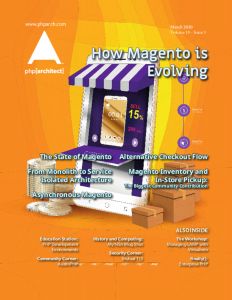It is quite interesting to look back over the history of a project and see how far it’s come. I am pretty sure there’s a book to be written about the journey and impact of Magento on the world of ecommerce. What started as an idea in 2006 evolved into a community-backed application that fundamentally shifted the balance of power from vendors to merchants, allowing them to build the experiences that matter for their audience.
Over the years, Magento architecture has become more sophisticated and complex because merchants’ requirements are becoming more complex. This complexity leads to an increase of application infrastructure, release cycles, and the number of features that have to be maintained. For Magento’s first decade, it was a monolith application which nicely covered mid-sized merchant needs. But as the system grows, the more difficult it becomes to maintain this monolith architecture.
This article looks at service isolation in Magento, which is an approved and confirmed aspect of our future architecture as we continue to anticipate and adjust to market demands.
Checkout functionality is one of the most important parts of any ecommerce platform. In this article, we look at the existing checkout flow and upcoming improvements to streamline customizing it.
Throughout multiple iterations of Magento 1 and Magento 2, inventory features were limited to work only with a single physical goods location and provided limited configuration options. As an open-source platform, Magento has long listened closely to its developer and merchant community, who are empowered to request and develop new features for the product. One of the most requested features was support for multiple locations for the inventory and a set of APIs to perform everyday day-to-day actions efficiently.
One of the initial draws for PHP was and has always been, the ability to be quickly set up and have a developer get code working through a web browser. While something like client-side JavaScript can be done with nothing more than a browser, many other languages still need help to serve a webpage. That may come in the form of frameworks, like Flask in Python, but most languages need additional dependencies or scaffolding to work.
Virtualmin is a web hosting and cloud computing control panel. A hosting control panel is a web-based application that runs on a server and manages all the aspects of a hosting account. This includes account information, websites, web servers, databases, mail servers, and all the other services which ultimately work together to allow you to run your application. The value Virtualmin provides is the ability to run my servers while striking a balance between wanting to control the server without having to perform tedious tasks manually. It handles operations like writing virtual host configurations, creating database users and managing permissions, and also managing system users
Certificates issued to protect transport layer security (TLS) help identify servers and protect data in transit through encryption. They can also be used to identify clients making the connection. Let’s look at ways to handle TLS configuration and usage correctly in a PHP application.
The secret to finding and fixing the problem was in discerning patterns in the noise. I can’t share the actual code that fixed the problem. What I can do, though, is walk you through an exercise in finding patterns in the noise of a seemingly-random number. We’ll have fun!
Within Texas, is the beautiful city of Austin. One of the fastest-growing cities in the United States and the State Capital of Texas. Austin has caught the eye of more than cowboys and musicians. It’s caught the eye of tech with several Fortune 500 companies establishing a presence in Austin. Logan has taken the time to write up a profile for AustinPHP, and I would like to share that with you. Logan Lindquist wrote the following article.
This month’s magazine focused on Magento, which by its nature, is one embodiment of Enterprise PHP. But what do we mean when we say “Enterprise PHP” anyway? Several things get drawn up into that phrase.
![php[architect] logo](/wp-content/themes/phpa/images/new_logo_mark_nav.png)



Responses and Pingbacks
March 6th, 2020 at 7:13 pm
[…] The magazine I edit and publish has four features on Magento this month and it’s free (with a registration): March 2020 – How Magento is Evolving […]